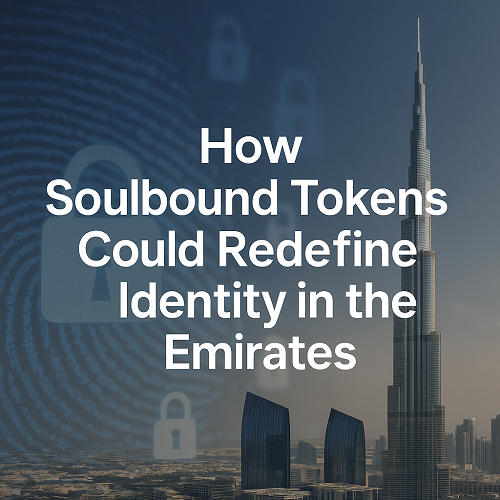Table of Contents
- Introduction
- What Are Soulbound Tokens (SBTs)?
- How SBTs Work: A Simplified Overview
- Why the UAE Is an Ideal Environment for SBT Adoption
- Potential Use Cases of Soulbound Tokens in UAE
- Digital Identity Management
- Verified Academic and Professional Credentials
- Healthcare and Patient Data
- Immigration and Visa Systems
- Real Estate Ownership and Tokenization
- SBTs vs Traditional NFTs: Key Differences
- Challenges and Limitations of SBTs
- Regulatory Considerations in the UAE
- How Web3 and SBTs Align with Dubai’s Digital Economy Vision 2031
- Future Outlook for Soulbound Tokens in UAE
- FAQs
- Conclusion
- Websima
Introduction
With Dubai positioning itself as a global hub for Web3, blockchain, and digital identity solutions, a new wave of innovation is redefining how individuals own and manage their credentials. Among these innovations are Soulbound Tokens (SBTs) — a unique type of non-transferable token designed to represent personal achievements, memberships, certifications, and identity attributes directly on the blockchain.
In the UAE, where initiatives like the Dubai Blockchain Strategy and the UAE Digital Government framework are pushing toward a decentralized, trusted society, the adoption of decentralized identity wallets in UAE and Soulbound Tokens could revolutionize digital identity. From visa processes to academic certifications, the possibilities are endless.
What Are Soulbound Tokens (SBTs)?

Soulbound Tokens (SBTs) are non-transferable NFTs tied permanently to a user’s wallet address — or “soul.” They can represent:
- Verified identity credentials
- Professional licenses
- Academic degrees
- Medical records
- Memberships and affiliations
Unlike regular NFTs, SBTs cannot be bought, sold, or traded. Their primary value lies in trust and verifiability, making them a perfect tool for building digital reputations.
The concept of SBTs was introduced by Vitalik Buterin, co-founder of Ethereum, in his whitepaper “Decentralized Society: Finding Web3’s Soul”. His vision aligns closely with Dubai’s ambition to create transparent, digitally powered ecosystems.
How SBTs Work: A Simplified Overview
- Issuance
A trusted entity (e.g., Dubai Land Department, UAE Ministry of Education, or MOHAP) mints a Soulbound Token and links it to a user’s blockchain wallet. - Verification
Anyone interacting with the wallet can confirm the authenticity of the credentials without revealing sensitive data. - Permanence
Since SBTs are non-transferable, they stay locked to the user’s wallet, preventing fraud or misrepresentation. - Interoperability
SBTs can integrate across government, banking, real estate, and healthcare platforms, creating a unified digital identity.
Why the UAE Is an Ideal Environment for SBT Adoption
Real-world assets are coming onchain in a whole new way.@OMG_Assembly is launching exclusively on Sui, letting users mint Soulbound Tokens as credentials to access their RWA investment platform — opening doors to opportunities like commodities, private credit, GPUs, and more. pic.twitter.com/gRHzTo6522
— Sui (@SuiNetwork) May 21, 2025
The UAE has been proactive in adopting blockchain technology, making it an innovation-friendly hub for SBT deployment:
- Dubai Blockchain Strategy aims to digitize 100% of government documents.
- The UAE Digital Government Initiative promotes secure, cross-platform identity solutions.
- The Virtual Assets Regulatory Authority (VARA) is laying frameworks to govern Web3 ecosystems.
- Integration with initiatives like UAE PASS can accelerate secure, blockchain-based identity systems.
This regulatory clarity and digital-first vision make the UAE one of the most promising markets for Soulbound Tokens. Besides, the expansion of digital wallet adoption accelerates crypto usage in Dubai as well as the UAE.
Potential Use Cases of Soulbound Tokens in UAE

1. Digital Identity Management
SBTs can serve as verified digital passports for Emirati citizens, residents, and expats:
- Eliminates repeated KYC processes across banks and government agencies.
- Ensures a single source of truth for identity verification.
- Integrates with platforms like UAE PASS to streamline public services.
2. Verified Academic and Professional Credentials
Educational institutions like UAE University or Khalifa University could issue SBT-based diplomas:
- Employers instantly verify degrees via blockchain.
- Prevents fake certificate scams — a growing GCC concern.
- Licensing authorities can issue non-transferable tokens for professionals like doctors, lawyers, and engineers.
3. Healthcare and Patient Data
The UAE is investing heavily in digital health ecosystems. SBTs can:
- Securely store medical history and lab results.
- Grant hospitals and insurance providers permission-based access.
- Reduce duplication across healthcare systems, saving time and costs.
4. Immigration and Visa Systems
Dubai and Abu Dhabi process millions of residency visas annually. Soulbound Tokens can:
- Store visa statuses and entry permits directly on-chain.
- Enable airlines, employers, and landlords to verify residency instantly.
- Reduce paperwork and enhance border security compliance.
5. Real Estate Ownership and Tokenization
For property transactions, especially under Dubai Land Department (DLD):
- SBTs can represent verified title deeds or ownership rights.
- Integrates seamlessly with tokenized real estate platforms.
- Prevents ownership disputes by ensuring credentials cannot be transferred fraudulently.
SBTs vs Traditional NFTs: Key Differences
| Feature | Soulbound Tokens (SBTs) | Traditional NFTs |
| Transferability | Non-transferable | Transferable |
| Purpose | Verified credentials, identity | Collectibles, art, ownership |
| Value | Based on trust and authenticity | Based on market demand |
| Privacy | Linked to identity wallets | Linked to assets |
| Applications | Identity, healthcare, education, real estate | Gaming, art, DeFi |
Challenges and Limitations of SBTs
- Data privacy concerns for on-chain credentials.
- Need for interoperable standards between institutions.
- User recovery mechanisms if wallets are compromised.
- Aligning regulations across federal and emirate-level frameworks.
Regulatory Considerations in the UAE
The UAE is already leading in Web3 regulation:
- Virtual Assets Regulatory Authority (VARA) in Dubai governs tokenized ecosystems.
- Abu Dhabi Global Market (ADGM) provides frameworks for digital assets.
- For Soulbound Tokens in UAE, upcoming guidelines will need to address:
- Data residency and privacy compliance.
- Integration with UAE PASS.
- International alignment with identity wallet standards.
How Web3 and SBTs Align with Dubai’s Digital Economy Vision 2031
Dubai’s Digital Economy Vision 2031 seeks to:
- Double the digital economy’s contribution to GDP to 19.4%.
- Position Dubai as a Web3 innovation hub.
- Drive transformation through blockchain-powered identity ecosystems.
SBTs play a key role by enabling:
- Frictionless identity verification.
- Trusted, non-transferable credentials.
- A decentralized framework for social trust in the Web3 economy.
Future Outlook for Soulbound Tokens in UAE
By 2030, the UAE could become a global leader in blockchain-based identity systems.
Expected advancements include:
- Integration with UAE PASS for unified blockchain identity.
- Cross-border partnerships for international credential verification.
- Tokenized trust scores for Web3-native platforms, powered by verified SBTs.
FAQs
1. What are Soulbound Tokens?
Soulbound Tokens are non-transferable NFTs representing verified personal credentials.
2. How do SBTs differ from NFTs?
SBTs are non-transferable and represent identity and trust, unlike NFTs, which are transferable assets.
3. Are Soulbound Tokens legal in the UAE?
Yes, the UAE’s Web3-friendly regulations and VARA frameworks support SBT adoption.
4. Can SBTs integrate with UAE PASS?
Yes, they can enhance UAE PASS by adding blockchain-based verifiability.
5. Where could SBTs be applied first in the UAE?
Likely in digital identity, visa systems, education, and real estate tokenization.
Conclusion
Soulbound Tokens in UAE have the potential to redefine digital identity and trust in the Emirates. Leveraging blockchain’s immutability and security, SBTs can simplify verification in education, healthcare, immigration, and property ownership while aligning with Dubai’s Digital Economy Vision 2031.
As the UAE strengthens its position as a Web3 pioneer, Soulbound Tokens could become the foundation of a decentralized identity ecosystem, enabling a secure, transparent, and globally integrated future.
Websima: Your Partner in Web3 Identity Solutions
At Websima, we help businesses, institutions, and government entities integrate Web3 technologies and develop blockchain-powered identity systems tailored to UAE regulations.
Whether you’re seeking to:
- Build secure identity solutions using Soulbound Tokens,
- Develop custom Web3 platforms, or
- Integrate blockchain-based verification into your services,
Our experts can make it happen.
Contact Us Today to explore how Websima can help you shape the future of digital identity in the UAE.





